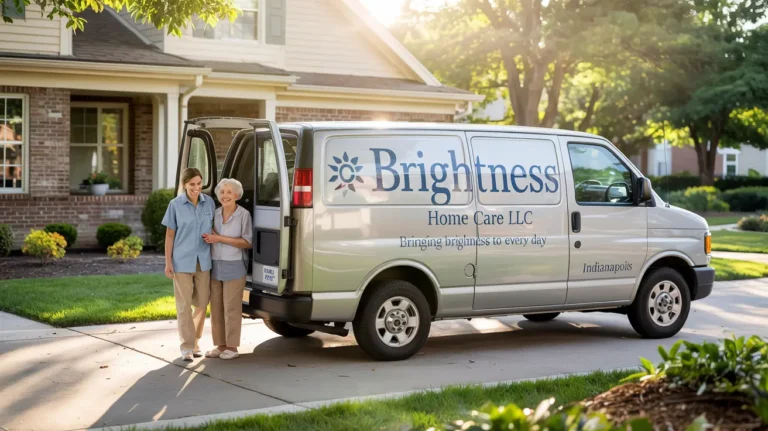Memory Care Nutrition in Indianapolis: Expert Tips from Brightness Home Care LLC
Did you know that nearly 60% of individuals with dementia experience significant weight loss and nutritional challenges? I was shocked when I first learned this statistic while training as a caregiver years ago. It completely changed how I approached mealtime with memory care patients.
Nutrition isn’t just about keeping the body healthy—it’s absolutely crucial for brain function and can significantly impact cognitive health for seniors dealing with memory issues. I’ve seen firsthand how the right nutritional approach can make a world of difference in someone’s quality of life and cognitive function.
Here at Brightness Home Care LLC, located at 4911 West 38th street in Indianapolis, we’ve developed specialized approaches to memory care nutrition that go beyond basic meal preparation. Our team understands the unique challenges facing families throughout Indianapolis when caring for loved ones with memory impairments.
In this guide, I’ll share everything I’ve learned about memory care nutrition over my years working with seniors in Indianapolis—from brain-boosting nutrients to practical mealtime strategies that actually work. Trust me, I’ve made plenty of mistakes along the way so you don’t have to!
Understanding Memory Care Nutrition Needs
Let me tell you about Mrs. Johnson (not her real name, of course), a client I worked with when I first started in memory care. She’d been steadily losing weight for months before her family contacted us, and nobody could figure out why. Turns out, she was forgetting she hadn’t eaten yet and kept telling her previous caregivers she’d already had breakfast or lunch!
This experience taught me that memory care nutrition needs go way beyond regular senior nutrition. Individuals with cognitive impairments face unique challenges that require specialized approaches.
The brain is incredibly hungry—it uses about 20% of our daily calories despite being only 2% of our body weight! When cognitive decline enters the picture, nutrition becomes even more critical. I’ve noticed that many memory care patients experience changes in taste and smell, decreased appetite, and difficulty recognizing hunger cues.
Some common signs I look for when assessing nutritional status include unexplained weight loss, decreased interest in food, difficulty using utensils, and changes in food preferences (suddenly loving sweets when they never did before is actually pretty common).
Research suggests certain nutrients may help support brain function even as cognitive decline progresses. I’ve seen improvements in alertness and engagement when we implement proper nutritional strategies. The connection between the gut and brain is fascinating—what we eat directly impacts cognitive function through various pathways involving inflammation, neurotransmitter production, and more.
At Brightness Home Care, we start with a comprehensive nutritional assessment for each client. This isn’t just about counting calories—we look at medication interactions, swallowing ability, food preferences, and eating patterns to create truly individualized plans.
Essential Nutrients That Support Cognitive Function
I’ll never forget the time I introduced omega-3 rich foods into my client George’s diet. Within weeks, his family noticed he seemed more alert during their visits. Now, I’m not saying it was a miracle cure—memory conditions are complex—but I’ve consistently seen how certain nutrients seem to support better brain function.
Omega-3 fatty acids are superstars for brain health. Think fatty fish like salmon, walnuts, and flaxseeds. I try to incorporate these into at least 3-4 meals weekly for our memory care clients. The anti-inflammatory effects appear to be particularly beneficial for the aging brain.
Antioxidant-rich foods are another big focus in our meal planning. Blueberries, dark chocolate, and colorful vegetables help fight oxidative stress that damages brain cells. One simple trick I’ve learned is adding berries to morning oatmeal—it’s an easy win that many of our clients actually enjoy.
B vitamins, especially B6, B12, and folate, support neurological function. As we age, absorption decreases, making deficiencies more common. Eggs, leafy greens, and lean proteins are excellent sources that we incorporate regularly. I had one client who showed remarkable improvement in alertness after we addressed a B12 deficiency!
Hydration deserves special attention. Many memory care patients simply forget to drink, which can rapidly lead to confusion and worsening cognitive symptoms. I learned this lesson the hard way when one of my early clients was hospitalized for dehydration. Now I use scheduled reminders, appealing beverages, and water-rich foods to ensure adequate fluid intake.
Vitamin E, found in nuts, seeds, and avocados, has shown some promise in supporting brain health. I’ll often prepare simple snack plates with nuts and avocado that provide healthy fats and important micronutrients.
The Mediterranean diet pattern as a whole seems particularly beneficial. I’ve adapted many traditional Mediterranean recipes to suit Indiana palates while maintaining the brain-healthy benefits. It’s all about making small, sustainable changes rather than overwhelming clients with totally unfamiliar foods.
Creating Memory-Friendly Meal Plans in Indianapolis
When I first started creating meal plans for memory care clients in Indianapolis, I made the mistake of not considering local food preferences and availability. Let me tell you, that didn’t go over well! Now I know better—integrating brain-healthy nutrition with familiar Indiana flavors makes all the difference.
Indianapolis has some fantastic farmers markets where we source fresh, seasonal produce. The Broad Ripple Farmers Market has been my go-to for years. Fresh, local produce generally has higher nutrient content, which directly benefits brain health. During winter months, we pivot to frozen fruits and vegetables, which are often flash-frozen at peak ripeness.
At Brightness Home Care LLC, we’ve developed a system for personalized meal planning that accounts for cognitive health needs while respecting individual preferences. We start by interviewing family members about longtime favorites and food traditions. You’d be surprised how often food preferences remain intact even when other memories fade.
Here’s a sample day from one of our memory-friendly meal plans:
- Breakfast: Overnight oats with walnuts, cinnamon, and berries (good balance of protein, healthy fats, and antioxidants)
- Lunch: Turkey sandwich on whole grain bread with avocado and a side of vegetable soup (familiar format with brain-healthy additions)
- Afternoon snack: Greek yogurt with honey and crushed walnuts (protein and healthy fats)
- Dinner: Baked salmon with sweet potato and steamed broccoli (omega-3 rich main with colorful, nutrient-dense sides)
We’ve found creative ways to adapt Indiana classics with brain health in mind. For instance, we’ll prepare a modified version of the classic Indiana breaded pork tenderloin using almond flour instead of traditional breading and baking rather than frying. It maintains that familiar taste while improving the nutritional profile.
Seasonal considerations matter too. During summer, we emphasize cooling, hydrating foods and lighter preparations. Winter calls for warming, comforting dishes that still deliver brain-supporting nutrients. I’ve found this seasonal approach helps maintain good intake year-round.
Mealtime Strategies for Memory Care Patients
I’ll never forget my frustration when I first tried to help Mr. Rodriguez with his meals. I kept trying to correct his utensil use and ended up just making him agitated and less likely to eat. Huge mistake on my part! That experience taught me that creating a positive mealtime environment is far more important than perfect table manners.
Creating the right environment makes all the difference. I recommend minimizing distractions, using contrasting colors (like dark plates on light tablecloths to help with visual perception), and maintaining a calm, unhurried atmosphere. Consistent mealtime routines help trigger recognition and readiness to eat.
For clients who struggle with independence, we implement a technique I call “hand-under-hand” guidance—rather than feeding someone, I’ll gently place my hand under theirs to guide the utensil. This preserves dignity while providing necessary support. It took me weeks to perfect this approach, but it’s been game-changing for many clients.
Common eating challenges include forgetting how to use utensils, getting distracted mid-meal, or not recognizing food. At Brightness Home Care LLC, we train all our caregivers in specific techniques to address these issues. Sometimes it’s as simple as offering one food at a time rather than a full plate that might overwhelm someone.
Adaptive equipment has come a long way! We utilize specialized utensils with larger grips, plates with high edges to prevent food from being pushed off, and cups designed to minimize spills. These tools can make the difference between eating independently and requiring full assistance.
I’ve found that finger foods can be incredibly effective for maintaining independence when utensil use becomes challenging. We create nutritionally complete finger food meals like chicken skewers with vegetables, quartered sandwiches, or vegetable frittata squares.
Timing matters too. Many of our clients do better with smaller, more frequent meals rather than three larger ones. Understanding individual energy patterns throughout the day helps us schedule meals when clients are most alert and receptive.
Managing Special Dietary Needs and Restrictions
Managing dietary restrictions alongside memory care needs can be tricky—I learned this the hard way when working with a client who had both diabetes and early-stage Alzheimer’s. Balancing blood sugar needs with cognitive health considerations required some creative problem-solving!
Many memory care patients have co-existing conditions like diabetes, heart disease, or kidney problems that require dietary modifications. At Brightness Home Care LLC, we develop comprehensive plans that address all health needs without compromising nutrition. Sometimes this means getting really creative with recipes and meal planning.
Texture modifications present another common challenge. Dysphagia (swallowing difficulties) affects many individuals with advanced dementia. We follow specific guidelines for preparing foods at different texture levels—from slightly soft to pureed—while maintaining flavor, appearance, and nutritional value. I’ve spent countless hours perfecting techniques to make pureed foods look appealing and recognizable.
Food allergies and sensitivities require vigilant monitoring and clear communication among all caregivers. We maintain detailed records and ensure consistency in food preparation. Cross-contamination prevention becomes especially important when memory impairment means the client can’t advocate for themselves regarding allergies.
Medication interactions with food present yet another layer of complexity. Some common dementia medications have specific timing requirements related to meals. Our care plans include detailed medication schedules coordinated with optimal meal timing.
One approach I’ve found particularly effective is what I call “progressive adaptation”—making small, incremental changes to meet health requirements while maintaining familiar tastes and appearances. For example, gradually reducing sodium in a favorite recipe over time rather than making drastic changes all at once.
At Brightness Home Care LLC, we regularly collaborate with dietitians, speech therapists, and physicians to ensure our nutritional approaches align with each client’s comprehensive healthcare plan. This multidisciplinary approach has proven invaluable for complex cases.
How Brightness Home Care LLC Approaches Memory Care Nutrition
When I first joined Brightness Home Care LLC at 4911 West 38th street in Indianapolis, I was impressed by their comprehensive approach to memory care nutrition. Unlike other places I’d worked that treated food as an afterthought, Brightness puts nutrition front and center in their memory care program.
Every caregiver here undergoes specialized training in memory care nutrition. We learn about the science behind brain-healthy foods, practical feeding techniques, and the emotional aspects of mealtime. This training gets updated regularly as new research emerges—I just completed a refresher course last month that included some fascinating new findings about gut-brain connections.
Our assessment process goes beyond basic nutritional screening. We conduct detailed evaluations of swallowing ability, food preferences, eating patterns, and mealtime behaviors. Family members are integral to this process, providing insights about longstanding preferences and eating habits. This comprehensive approach allows us to create truly personalized nutrition plans.
We don’t work in isolation. Regular collaboration with dietitians, speech therapists, and physicians ensures our nutritional approaches complement medical treatment plans. For complex cases, we coordinate team meetings to address challenges from multiple perspectives.
Nutrition plans aren’t static documents—they evolve as needs change. We implement systematic monitoring of weight, intake, and eating behaviors, making adjustments as needed. Sometimes these changes happen gradually over time, while other situations require rapid adaptation.
I remember working with one family who was at their wits’ end because their mother had stopped eating almost entirely. Through patient observation and trial-and-error, we discovered she had developed sensitivity to cold foods but would happily eat the same items when served warm. This simple adjustment made a tremendous difference!
Our approach extends beyond just the food itself. We create personalized dining environments, honor cultural food traditions, and recognize that mealtime is as much about social connection as it is about nutrition. Some of our most successful strategies focus on making meals engaging social experiences.
Conclusion
After years of working with memory care patients throughout Indianapolis, I’ve learned that nutrition is truly one of the most powerful tools we have to support cognitive health and quality of life. The right approach to food can make a remarkable difference in day-to-day functioning and overall wellbeing.
Every person’s journey with memory impairment is unique, which is why personalized nutrition plans are so essential. What works beautifully for one person might be completely ineffective for another. This is why professional guidance from experienced providers like Brightness Home Care LLC can be invaluable for families navigating these challenges.
Safety considerations should always remain top of mind—from choking prevention to food-medication interactions. Many families don’t realize the risks until they’ve had a frightening experience. Proper training and awareness can prevent dangerous situations before they occur.
If you’re caring for a loved one with memory impairment in Indianapolis, remember that you don’t have to figure everything out alone. The team at Brightness Home Care LLC at 4911 West 38th street specializes in memory care nutrition and can provide the support and expertise your family needs.
I’d love to hear about your experiences with memory care nutrition. What challenges have you faced? What strategies have worked well for your loved one? Share your stories in the comments—your insights might be exactly what another family needs to hear right now.







